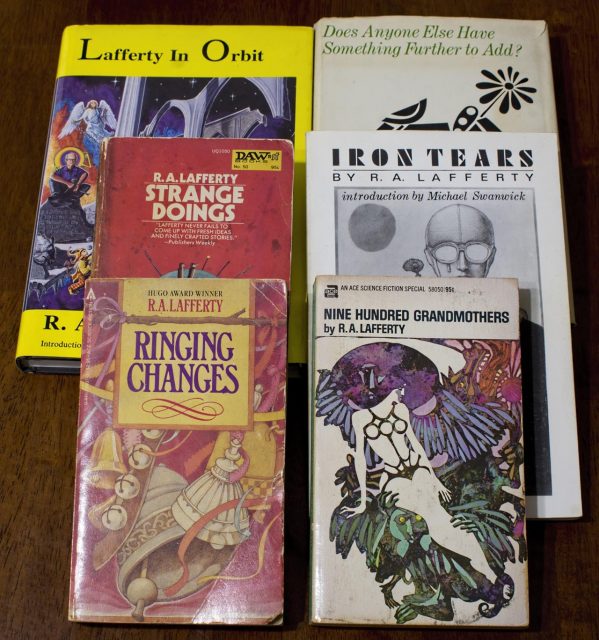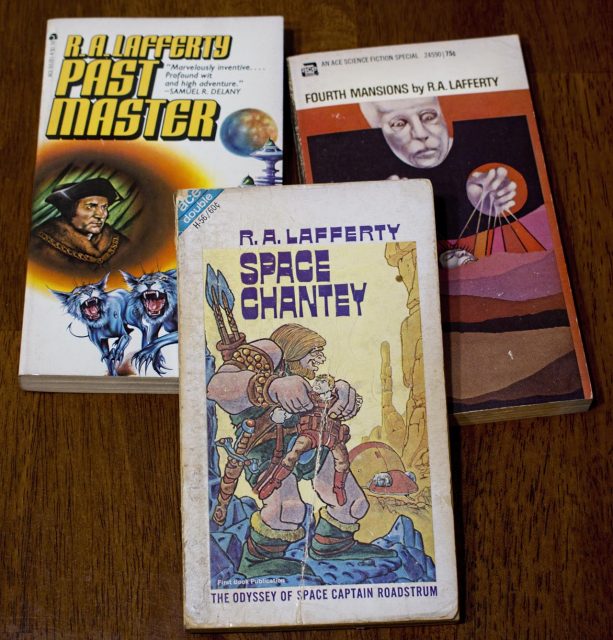It’s February 2, on which day bloggers present favorite poems if they remember to. Since twenty-first century culture is permeated with malignant nonsense, it is appropriate to post some benign nonsense as an antidote. Here is the White Knight’s song from Through the Looking-Glass, first read by Sir John Gielgud, and then set to music by Gryphon.
Category: Words
Today’s useful word
And so I propose the FRAUDULUM. It is the smallest unit of fraud. I define it to be the amount of fraud that is taking place when a husband tells his wife that the pants do not make her ass look fat. When you call a company and their recorded message tells you “Your call is very important to us,” that is 2 or 3 fraudulum. When the gas company calls and you tell them the check is in the mail, that is a dozen fraudulum. A dozen dozen fraudulum is a gross fraudulum, and that’s when a politician tells you “I feel your pain.”
(The proper response to anyone who says “I feel your pain” is “Hand me a baseball bat and I’ll validate your feelings.”)
Divergence
The fact that our gal Flannery is repeatedly castigated and critiqued for “racism” when….hoo boy ….have you read Hemingway lately?
Let me put it this way. I would have no problem teaching any work of O’Connor – even a story with a title like “The Artificial Nigger” to any group of students, while I would give serious pause to teaching something like The Killers or The Battler.
What’s the difference? Well, if you are agonizing over whether or not O’Connor was racist, you should take a look at those two stories, compare and contrast. In Hemingway, his narrators regularly describe and characterize Black characters by the n-word, and describe their characteristics in those terms – as qualities or quirks specific to Black people – but not called Black. In O’Connor, her characters may think racist thoughts and treat Black people poorly…because that’s what those characters would do. And racist characters are there, not just because they were in her world and she was committed to accuracy, but because they are, and are ultimately understood as, one more specimen of that thing called Pride.
It doesn’t make it super-easy to have students encounter these words and descriptions and views, but at least in O’Connor they are presented as expressions of specific characters living in a specific place. Hemingway, being a bit more abstracted from time and place in many of his stories, has his mostly objective narrators describe Black characters in racist, stereotypical terms.
In O’Connor’s world, racism exists in the world, but it is obviously a damaged part of a fallen world. In Hemingway, racist attitudes are just The Way It Is, no problem, no argument, no tension.
Wordplay
Winter thus far has been mild here, with little snow and ice. Nevertheless, I’m in the mood for an old favorite by the lunatic from Idaho.
Winter is icummen in,
Lhude sing Goddamm.
Raineth drop and staineth slop,
And how the wind doth ramm!
Sing: Goddamm.Skiddeth bus and sloppeth us,
An ague hath my ham.
Freezeth river, turneth liver,
Damn you, sing: Goddamm.Goddamm, Goddamm, ’tis why I am, Goddamm,
So ‘gainst the winter’s balm.Sing goddamm, damm, sing Goddamm.
Sing goddamm, sing goddamm, DAMM.
I particularly like how Pound exploits the rhymes to make the pleasant word “balm” sound like an obscenity.
Another nice word that sounds like an obscenity to me nowadays, for other reasons: “safe.”
Today’s curious fact
There are more expressions and proverbs concerning the nose in Russian than in any other language in the world.
(From here.)
Littul kittons
The news of undead Danish mink reminds me of certain other unusual mink which I would also prefer not to encounter
Today’s quote
F.L. Lucas, via Joseph Epstein:
I have come passionately to prefer sense to sensibility, and even cynics (if one must have either) to rhapsodists and rapturists. . . . I can only suggest that humanity seems throughout its history to have suffered far worse from mental intoxications and fanaticisms than from any rare excess of sober reason.
Bonus quote:
I sometimes wonder if there have not been two great disasters in the history of modern letters: the first when literature began to be a full-time profession, with writers like Dryden and Lesage, instead of remaining a by-product of more sanely active lives; the second, when the criticism of literature became likewise a profession, and a livelihood for professors.
Ideology and Mrs. Turpin
So Flannery O’Connor was an irredeemable racist and must be expunged from our culture? Here’s “Revelation,” one of her last stories. Read it, and judge for yourself.
Odds and ends, mostly odd
Today’s useful term: “counter-Renaissance.” E.g.,
The Nazi leader who described the National Socialist revolution as a counter-Renaissance spoke more truly than he probably knew. It was a decisive step in the destruction of that civilization which modern man had built up from the age of the Renaissance….
—F.A. Hayek, The Road to Serfdom.
***
… for all the (mostly true) complaints about how horribly misogynist the Gor novels were, the core audience was female. The local bookstore clerks who more-or-less adopted me in the late Seventies often laughed about how women would come up to the counter with a Gor novel artfully concealed in the middle of their purchases.
I tried reading one of Norman’s novels once but gave up half-way through. He didn’t like women and had no understanding of them. Or so I thought — apparently he understood some well enough.
***
Greely found a little game:
“List 5 famous people you’ve either met or have been within a few feet of, but ONE is a lie. Then let your friends guess which one they think is a lie.”
Let’s play.
1. Wendy Whelan
2. Phil Keaggy
3. William F. Buckley, Jr.
4. R.A. Lafferty
5. James Lee Burke
(Don’t recognize all the names? All are legendary in their fields, though those fields might be ballet or music, rather than sports or television.)
***
Today’s quote
“She hasn’t got any intellect to speak of; but you don’t need any intellect to be an intellectual.”
— G.K. Chesterton, “The Scandal of Father Brown”
Words, words, words
Don’t use the past tense of “to do” online, or Google will delete you.
(Via Pixy.)
***
Expert is not the English word of the same spelling and pronunciation, and which means “one who has skill, experience, or extensive knowledge in his calling or in any special branch of learning.” This old word still exists and is in use in areas in which deplorables are to be found.
But this old useful word is just not the same as the modern expert. This modern word, which can only be distinguished in context from the old, means “a flack who repeats the consensus, and who causes the consensus.”
***
“Reactionary” may be an unsatisfactory term, but…
… I suppose bearing with things that you’re stuck with because they’ve been codified by long use is more or less a principle of being a reactionary. So it all works out!
Outwardly respectable
It’s February 2 today, when the students at the University of Dallas traditionally drink beer in the chilly drizzle at Forker Field (do they still do that?), and when bloggers post favorite poems if they remember to. So, here’s “Macavity, the Mystery Cat,” which I recited to my bored and fidgety classmates at grade school #4.
Macavity’s a Mystery Cat: he’s called the Hidden Paw—
For he’s the master criminal who can defy the Law.
He’s the bafflement of Scotland Yard, the Flying Squad’s despair:
For when they reach the scene of crime—Macavity’s not there!Macavity, Macavity, there’s no one like Macavity,
He’s broken every human law, he breaks the law of gravity.
His powers of levitation would make a fakir stare,
And when you reach the scene of crime—Macavity’s not there!
You may seek him in the basement, you may look up in the air—
But I tell you once and once again, Macavity’s not there!Macavity’s a ginger cat, he’s very tall and thin;
You would know him if you saw him, for his eyes are sunken in.
His brow is deeply lined with thought, his head is highly domed;
His coat is dusty from neglect, his whiskers are uncombed.
He sways his head from side to side, with movements like a snake;
And when you think he’s half asleep, he’s always wide awake.Macavity, Macavity, there’s no one like Macavity,
For he’s a fiend in feline shape, a monster of depravity.
You may meet him in a by-street, you may see him in the square—
But when a crime’s discovered, then Macavity’s not there!He’s outwardly respectable. (They say he cheats at cards.)
And his footprints are not found in any file of Scotland Yard’s.
And when the larder’s looted, or the jewel-case is rifled,
Or when the milk is missing, or another Peke’s been stifled,
Or the greenhouse glass is broken, and the trellis past repair—
Ay, there’s the wonder of the thing! Macavity’s not there!And when the Foreign Office find a Treaty’s gone astray,
Or the Admiralty lose some plans and drawings by the way,
There may be a scrap of paper in the hall or on the stair—
But it’s useless to investigate—Macavity’s not there!
And when the loss has been disclosed, the Secret Service say:
‘It must have been Macavity!’—but he’s a mile away.
You’ll be sure to find him resting, or a-licking of his thumbs,
Or engaged in doing complicated long division sums.Macavity, Macavity, there’s no one like Macavity,
There never was a Cat of such deceitfulness and suavity.
He always has an alibi, and one or two to spare:
At whatever time the deed took place—MACAVITY WASN’T THERE!
And they say that all the Cats whose wicked deeds are widely known
(I might mention Mungojerrie, I might mention Griddlebone)
Are nothing more than agents for the Cat who all the time
Just controls their operations: the Napoleon of Crime!
In a comment on a recent post, Fillyjonk mentioned that there were plans to give Cats a traditionally-animated movie version, with Steven Spielberg at the helm. While I would have preferred that Lloyd Webber et al had left Eliot’s poems alone, this probably would have been preferable to the recent movie. If nothing else, the sketches of Macavity more closely approximate my mental image of the feline Moriarty than the thug of the stage version.
Postcards from Boomer Flats
John C. Wright recently quoted R.A. Lafferty. Coincidentally, I spent part of the day moving all my Gene Wolfe and Lafferty books to their own bookcase. Over the years I’ve accumulated a bunch, most of them acquired on my regular visits to second-hand book stores.1 Around the turn of the century, Lafferty’s books disappeared even from used sources. I found a volume or two and some pamphlets from mail-order sources2, but pickings were slim.
Fortunately, now, about 30 years too late, there finally is a good introduction to the most original writer of the 20th century. The Best of R.A. Lafferty is available in the U.S. The table of contents is here; the book includes most of the essential stories.3. If you’ve ever been curious about this teller of tales unlike other tales, this is a good place to start.
Three of Lafferty’s early novels have also recently been reissued in a single volume. It’s been a long time since I read Past Master or Fourth Mansions, so I can’t say much except that I didn’t like them as much as the better short stories. They’re due for a re-reading; I might find more in them now. However, Space Chantey, Lafferty’s retelling of The Odyssey, is one of Lafferty’s funniest books and an old favorite.
“All right, girl,” Roadstrum said when they were alone. “I have a few questions. They will be to the point, and I want answers.”
I doubt that you could understand the answers,” Aeaea warned. “I see now that you are a common simpleminded man, and we maintain a very high intellectual average here. It will be difficult to communicate.”
“Who is the ‘we’ that maintains so high an average, girl?”
“Only myself now. My father has been dead these last several centuries.”
“It should be easy to maintain a high average with only one entity.”
“It is. I am mistress of all the sciences. I go so far beyond all else that my work is called magic. I manipulate noumena, regarding monads as points of entry tangential to hylomorphism. As to the paradox of Primary Essence being contained in Quiddity, the larger in the small, I have my own solution. The difficulty is always in not confusing Contingency with Accidence. Do you understand me?”
“Sure. You’re a witch.”
“Exactly, but I frown on the name. Very unscientific.”
***
I have several duplicate Lafferties on my shelves that need homes. If you are interested, send me an email. Please include “Lafferty” in the header so I don’t delete it with the blackmail spam and other digital trash.
Miscellany
Chainmail Bikini is back online.
***
Art or garbage? It’s hard to tell sometimes.
***
Derek Lowe recently added nitro groups to his “Things I won’t work with” category. You don’t need to be a chemist to enjoy his Lowe’s appreciations of azides, FOOF and other exceeding noisy or smelly substances.
***
“Any organization not explicitly right-wing sooner or later becomes left-wing.” This is, as everybody knows, Conquest’s Second Law. It is a true law, as all modern experience shows. But it says nothing about the pace or rate of the flight from Reality and Tradition.
A rock thrown upwards at the top of its flight is stationary. For a moment it neither goes up nor down. Then, a fraction of a second later, it begins it descent, but slowly, slowly. The speeds picks up, the rocks plummets faster and faster. It eventually crashes to the ground.
That’s the progress of rocks, a good but imperfect metaphor for the “progress” of human institutions. The imperfection comes in recalling a law Conquest didn’t mention: motus in fine velocior. Things accelerate toward the end. A falling rock has constant acceleration. Human failure is a force that feeds on itself.
***
100 things Mark Evanier learned about the comics industry….
93. If your character wears a cape, it should be more or less the same length in every panel and it should not get shredded more than twice a year.
***
Dr. Boli has completed his serial, Devil King Kun. From the 20th installment:
“Actually,” said Weyland, “good people generally don’t try to conquer the world. It’s not done, you know.”
“But if you don’t conquer the world, then won’t the evil people take over every time?”
“We generally prefer to let people choose their own government, and trust them to make the right choice.”
“Well,” said Miss Kun, “I’m willing to be good, but I’m not willing to be an idiot….”
The story begins here.
***
Saw Ginger Baker’s Jazz Confusion a couple of years ago and when a bloke in the audience shouted out for ‘Toad’ Baker asked if he’d ever had a drumstick shoved up his nostril.
The lovable Ginger Baker has been hospitalized, critically ill. Here’s an 1970 interview with the easy-going drummer, and a more recent look at the gentle soul.
Update: Ginger Baker has died at the age of 80.
Professor Mondo, a drummer himself, on Baker in 1990:
The other thing that struck me was that Ginger looked like a mad wizard from a fantasy novel, impossibly aged, but terrifyingly powerful. He was three years younger than I am now. I think both his mistakes as a human being and his phenomenal talent aged him in dog years.
See also Shabby Road for an overview of Baker’s life.
Have a Spoonful of Cream.
Literary notes
Why is it, Solzhenitsyn asks, that Macbeth, Iago, and other Shakespearean evildoers stopped short at a dozen corpses, while Lenin and Stalin did in millions? The answer is that Macbeth and Iago “had no ideology.” Ideology makes the killer and torturer an agent of good, “so that he won’t hear reproaches and curses but will receive praise and honors.” Ideology never achieved such power and scale before the twentieth century.
Up until current times, it would have been scandalous for a woman in a Catholic country to arrange her own marriage in defiance of her father. Romeo & Juliet is a cautionary tale against just such presumption. The nurse and the friar are the villains of the story, overstepping their rightful duties. Until modern times, readers of the play all understood this.
***
For literature of a different sort, see Dr. Boli.
The Joe DiMaggio of bloggers
For years, one of my first stops every morning after cranking up the computer was Dustbury. There would always be something new and worth reading. The proprietor, Charles G. Hill, a self-described “generalist and occasional wiseguy,” was intelligent and insightful. He was witty and clever, too, very good with bad puns, and an unabashed brony. He was always a pleasure to read. One of the few things I looked forward to on Mondays was his weekly survey of search terms leading to his site, with a wisecrack for each item. His familiarity with obscure popular music rivaled that of the Professor, and he had a healthy appreciation of fine stemware.

It wasn’t all wisecracks at Dustbury, though. Hill struggled with depression all his life. During the past few years he faced worsening problems with health and mobility. His “Vents” were often painful to read, and other posts could be disturbing. Although our interaction was limited to occasionally leaving a comment at each other’s site, I worried about him.
Charles Hill passed away yesterday from injuries received in an accident.

If there is such a thing as a “national treasure” on the internet, it’s Charles G. Hill’s site. The text deserves to be printed on acid-free paper and available in libraries for ages to come. I hope someone capable steps up to preserve Dustbury, as Pixy Misa and J Greely did for Steven Den Beste’s sites.
When perusing Dustbury, be sure to check the tabs at the top of the page, as well as the main blog. There you will find much else of interest, such as his profile with Norm Geras:
What would you do with the UN?
I’m not quite sure, but I expect it involves dynamite….Do you have any prejudices you’re willing to acknowledge?
I shun anyone who can speak the word ‘multicultural’ with a straight face.
Update
Tributes to Dustbury: Roger Green; Steve Lackmeyer; Rob O’Hara.
(The post title is from John Salmon; the picture of Dawn Eden and Charles G. Hill is from Michael Bates.)
Odds and ends
Items of interest I came across recently.
Is anything still forbidden in Hollywood?
Jesuits, communism and Rod Dreher.
Jesuit vows and the Papacy. (Via TS)
The post-war conservative movement in the United States has not turned back the clock a single minute and has succeeded only in gradually lowering marginal tax rates as same-sex marriage became law in all 50 states….
If anyone else was interested in creating something like The Lamp it would have existed already. (In point of fact, something like it did exist in the late ’60s and early ’70s: Brent Bozell’s Triumph, almost certainly the only publication in which one could have read things like the traditionalist Catholic case for Black Panther militancy.4)
***
Bonus link: Elizabeth Scalia on Paul McCartney and Christianity.
Unforgettable, irreplaceable
Amy Welborn reminds us that today is E.B. White‘s birthday. Here’s a story of his I liked quite a bit when I was younger.
*****
The Supremacy of Uraguay
Fifteen years after the peace had been made at Versailles, Uruguay came into possession of a fine military secret. It was an invention in effect so simple, in construction so cheap, that there was not the slightest doubt that would enable Uruguay to subdue any or all of the other nations of the earth. Naturally the two or three statesmen who knew about it saw visions of aggrandizement; and although there was nothing in history to indicate that a large country was any happier than a small one, they were very anxious to get going.
The inventor of the device was a Montevideo hotel clerk named Martín Casablanca. He had got the idea for the thing during 1933 mayoralty campaign in New York City, where he was attending a hotel men’s convention. One November evening, shortly before election, he was wandering in the Broadway district and came upon a street rally. A platform had been erected on the marquee of one of the theatres, and in an interval between speeches a cold young man in an overcoat was singing into a microphone, “Thanks,” he crooned, “for all the lovely dee-light I found in your embrace …” The inflection of the love words was that of a murmurous voice, but the volume of the amplified sound was enormous; it carried for blocks, deep into the ranks of the electorate. The Uruguayan paused. He was not unfamiliar with the delight of a love embrace, but in his experience it had been pitched lower — more intimate, concentrated. This sprawling, public sound had a curious effect on him. “And thanks for unforgettable nights I never can replace …” People swayed against him. In the so bright corner in the too crowded press of bodies, the dominant and searching booming of the love singer struck sharp into him and he became for a few seconds, as he later realized, a loony man. The faces, the mask faces, the chill air, the advertising lights, the steam rising from the jumbo cup of A. & P. Coffee high over Forty-seventh Street, these added to his enchantment and his unbalance. At any rate, when he left and walked away from Times Square and the great slimy sounds of the love embrace, this was the thought that was in his head:
If it unhinged me to hear such a soft crooning sound slightly amplified, what might it not do to me to hear a far greater sound greatlier amplified?
Mr. Casablanca stopped. “Good Christ!” he whispered to himself; and his own whisper frightened him, as though it, too, had been amplified.
Allan smashed the ping-pong ball into the net so hard that it burst through the net….
The ball went from being a simple bouncing ball to a bouncing ball that exploded into the sky.
We could see the bouncing star and its ball of light that seemed to follow its path.
It was an incredible sight, and the best thing I did was get myself in the back corner. Then we could film our friends and family watching.
If I had been on the phone with my wife, she would have called me at home to tell me exactly what just happened.
At the end of everything, this world gave us the opportunity to experience being an astronaut on board the Space Shuttle. I couldn’t have been more grateful for the opportunity and thankful to every single human being that saved our world. That we are able to share the story of the space shuttle crew, one of the world’s most successful and innovative organizations, with you, to celebrate the 50th anniversary of the launch of the first Shuttle Space Shuttle program, is a truly wonderful thing. Thank you to our crew of astronauts and their families, who did so much for our country.
And now, I can say this: I will return to the shuttle. You were the only ones that would miss me there. If we ever return, we have to go through them all again.
* * *
Um, okay. Let’s try it again, this time with armadillos:
“Anthony Trollope” returns
Finally, some good news. H. Albertus Boli, Ll.D., the inventor of the letter “M” and the man who organized the construction of Portugal, is back.
Perhaps there will be some additions to Flora Pittsburghensis, but that may be too much to hope for.





